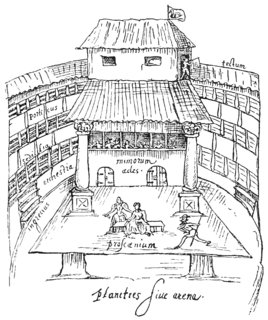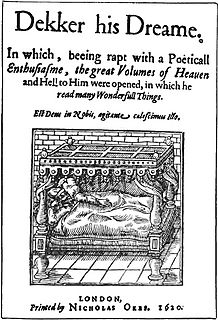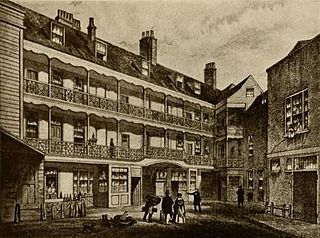
English Renaissance theatre, also known as Renaissance English theatre and Elizabethan theatre, refers to the theatre of England between 1558 and 1642.

Richard Burbage was an English stage actor, widely considered to have been one of the most famous actors of the Globe Theatre and of his time. In addition to being a stage actor, he was also a theatre owner, entrepreneur, and painter. He was the younger brother of Cuthbert Burbage. They were both actors in drama. Burbage was a business associate and friend to William Shakespeare.
This article lists notable literary events and publications in 1599.

Thomas Dekker was an English Elizabethan dramatist and pamphleteer, a versatile and prolific writer, whose career spanned several decades and brought him into contact with many of the period's most famous dramatists.
What You Will is a late Elizabethan comedy by John Marston, written in 1601 and probably performed by the Children of Paul's, one of the companies of boy actors popular in that period.

John Marston was an English playwright, poet and satirist during the late Elizabethan and early Jacobean periods. His career as a writer lasted only a decade. His work is remembered for its energetic and often obscure style, its contributions to the development of a distinctively Jacobean style in poetry, and its idiosyncratic vocabulary.

Every Man out of His Humour is a satirical comedy written by English playwright Ben Jonson, acted in 1599 by the Lord Chamberlain's Men. It is a conceptual sequel to his 1598 comedy Every Man in His Humour. It was much less successful on stage than its predecessor, though it was published in quarto three times in 1600 alone; it was also performed at Court on 8 January 1605.
The War of the Theatres is the name commonly applied to a controversy from the later Elizabethan theatre; Thomas Dekker termed it the Poetomachia.

Boy player refers to children who performed in Medieval and English Renaissance playing companies. Some boy players worked for the adult companies and performed the female roles as women did not perform on the English stage in this period. Others worked for children's companies in which all roles, not just the female ones, were played by boys.
Antonio and Mellida is a late Elizabethan play written by the satirist John Marston, usually dated to c. 1599.
Antonio's Revenge is a late Elizabethan play written by John Marston and performed by the Children of Paul's. It is a sequel to Marston's comic play Antonio and Mellida, and it chronicles the conflict and violence between Piero Sforza, the Duke of Venice, and Antonio, who is determined to take revenge against Piero for the death of his father and the slander of his fiancée. While it has much in common with other revenge tragedies , it is sometimes read as a hyperbolic parody of the genre.
The Malcontent is an early Jacobean stage play written by the dramatist and satirist John Marston ca. 1603. The play was one of Marston's most successful works.

Jack Drum's Entertainment is a late Elizabethan play written by the dramatist and satirist John Marston in c. 1599–1600. It was first performed by the Children of Paul's, one of the troupes of boy actors popular in that era.
The Children of Paul's was the name of a troupe of boy actors in Elizabethan and Jacobean London. Along with the Children of the Chapel, they were an important component of the companies of boy players that constituted a distinctive feature of English Renaissance theatre.
Queen Elizabeth's Men was a playing company or troupe of actors in English Renaissance theatre. Formed in 1583 at the express command of Queen Elizabeth, it was the dominant acting company for the rest of the 1580s, as the Admiral's Men and the Lord Chamberlain's Men would be in the decade that followed.
Poetaster is a late Elizabethan satirical comedy written by Ben Jonson that was first performed in 1601. The play formed one element in the back-and-forth exchange between Jonson and his rivals John Marston and Thomas Dekker in the so-called Poetomachia or War of the Theatres of 1599–1601.

The Scornful Lady is a Jacobean era stage play, a comedy written by Francis Beaumont and John Fletcher, and first published in 1616, the year of Beaumont's death. It was one of the pair's most popular, often revived, and frequently reprinted works.

In the historical era of English Renaissance drama, an Inn-yard theatre or Inn-theatre was a common inn with an inner courtyard with balconies that provided a venue for the presentation of stage plays.

In theatres, beginning in Elizabethan London, a jig was a short comic drama that immediately followed a full-length play. This phenomenon added an additional comic or light-hearted offering at the end of a performance. A jig might include songs sung to popular tunes of the day, and it might feature dance, stage fighting, cross-dressing, disguisings, asides, masks, and elements of pantomime.
-mastix is a suffix derived from Ancient Greek, and used quite frequently in English literature of the 17th century, to denote a strong opponent or hater of whatever the suffix was attached to. It became common after Thomas Dekker's play Satiromastix of 1602. The word μάστιξ (mastix) translates as whip or scourge.










